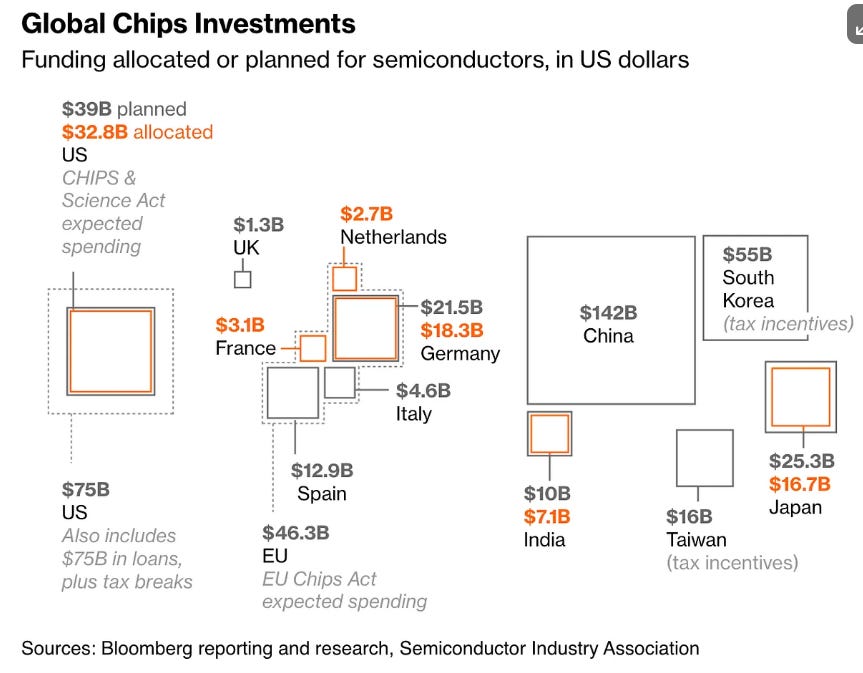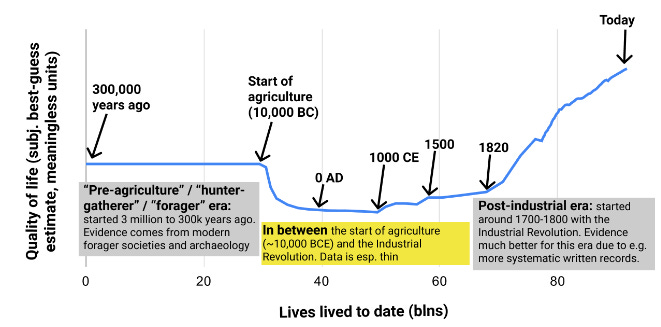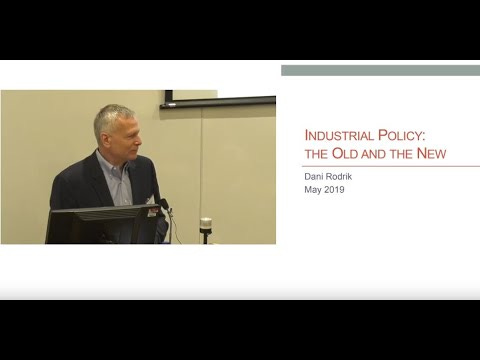BRIEFLY NOTED: For 2024-05-30 Th
I find Boltzmann’s Brain to be frighteningly plausible, so please help me; real interest federal debt costs; global chip investments; very briefly noted; just-what mixed federal-state felony crime...
I find Boltzmann’s Brain to be frighteningly plausible, so please help me; real interest federal debt costs; global chip investments; very briefly noted; just-what mixed federal-state felony crime might Trump be guilty of—and how can a state judiciary take cognizance of a federal crime?—Stalin was too a naif about Hitler; Farrell on MAMLMs as engines of summarization; Hogeland’s Hamilton’s Scheme; using the P-word—that is, “power over”—thinking about Econ 135 & the history of economic growth for this fall; excellence in presentation-of-self-as-celebrity; Friedrich Engels on the destructive anarchy of the market; the poverty of early iron-age Greece; & BRIEFLY NOTED: For 2024-05-23 Th…
ONE VIDEO: Boltzmann’s Brain by Brian Greene:
The scary thing is that I find this crazy argument almost completely airtight and frighteningly plausi…
“I am confident that I am not a Boltzmann brain. However, we want our theories to similarly concur that we are not Boltzmann brains, but so far it has proved surprisingly difficult for them to do so”—Brian Greene
ONE IMAGE: Real Interest Debt Costs for the U.S. Federal Government:
I confess I do not know why this is the “Yellen-preferred ratio” of the current debt burden. If you take the total level of spending in the economy as a whole as numéraire—which I believe you should—then there is also a (real growth) * (debt/GDP) term that should be subtracted from the real interest expense to get the right measure of the burden.
ANOTHER IMAGE: Global Chip Investments:
<https://www.bloomberg.com/news/features/2024-05-12/chip-technology-spending-gets-81-billion-boost-in-china-rivalry>: But over what time span?
<https://www.cold-takes.com/did-life-get-better-during-the-pre-industrial-era-ehhhh/>
Very Briefly Noted:
Journamalism: Somehow he has the idea that the sleeziest Republican has to be much better than the average Democrat: Brian Buetler: No, The Hush Money Trial Isn’t Helping Donald Trump: ‘Ross Douthat.. ignores… data to muse about how the trial might theoretically help Trump…. Factually, does not match the numbers…. If I were a tribune for spirituality, and not just trying to mind-trick Democrats into doubting their political advantages, I’d probably be more concerned about the damage Trump and his retinue of pseudo-holy hangers-on have done, and continue to do, to religious conservatism as a salable way of life…. Non-converts have identified the movement as deeply fraudulent: an organized effort to herd the hoi polloi into lives of repression and patriarchy, while leaders engage in unrestrained hedonism, and toggle between flaunting it and lying about it…. If I were an advocate of a more pious society I’d be happy to see Trump’s numbers drop in tandem with the hush-money case, and I’d be hopeful to see him convicted as a smiting. It’s what god would want… <https://www.offmessage.net/p/hush-money-trial-isnt-helping-trump>
Global Warming: Yet Phoenix is nothing compared to Delhi right now: Mark Gongloff: Phoenix Is Facing a Hurricane Katrina of Heat. It’s Not Alone: ‘A slow-motion catastrophe threatens the most vulnerable and stands as a cautionary tale for other cities…. In… Maricopa County… nearly 2,000 people have died of heat-related deaths in the past five years…. A power failure during a heat wave in Phoenix… will… kick a Heat Katrina into high gear. That’s all the more reason to dedicate attention and money to preparing for and minimizing the dangers… <https://www.bloomberg.com/opinion/articles/2024-05-29/phoenix-is-facing-a-deadly-hurricane-katrina-of-heat-spurred-by-climate-change?srnd=opinion>
War & Rumors of War: Much more thought needs to be spent on the primacy of internal politics and the derangements of authoritarian leaders; one would really think that people would by now know enough history to have a strong presumption that starting wars is a bad idea: Phil Zelikow: Confronting Another Axis? History, Humility, and Wishful Thinking: ‘The United States faces a purposeful set of powerful adversaries in a rapidly changing and militarized period…. This is the third time… first… 1937 and 1941… second was… 1948 and 1962…. It is not yet clear when and how the present-day crisis will resolve…. Recovering a few glimpses of other times in which there were rapid recalculations, quick turns, and surprises, we gain humility…. I look at the Chinese vision for peaceful coexistence… [not] Cold War detente in the early 1970s… [but like] Nikita Khrushchev… a prelude to heightened confrontation. I fear that the legacy of American success in its past global confrontations can encourage wishful thinking now…. I’m relatively optimistic over the medium and long term, but deeply worried about the challenge of getting through the next few years…. We can all reflect on what we misjudged back in early 2021… <https://tnsr.org/2024/05/confronting-another-axis-history-humility-and-wishful-thinking/>
Economics: This is a conclusion that I have been strongly, strongly resisting for the past two years; but when will be the time to fold and throw in my cards on this issue?: Torsten Sløk: The Fed Cut Reflexivity Paradox: ‘Financial conditions are significantly easier than when the Fed started raising interest rates in March 2022…. Strength in the stock market… strong earnings, including from NVIDIA…. Since the Fed pivot in November 2023, when the FOMC started talking about cuts instead of hikes, the S&P 500 market cap is up $9 trillion…. Combined with continued easy fiscal policy via the Chips Act, the Inflation Reduction Act, and the Infrastructure Act, it is not surprising that employment growth and inflation have been reaccelerating in 2024…. Fiscal policy is still a significant tailwind to the economy, and easy financial conditions have been offsetting Fed hikes. Looking ahead, with the stock market hitting fresh all-time highs and fiscal policy still supportive, the expectation in markets should be that the economy will continue to accelerate over the coming quarters. You can call this the Fed Cut Reflexivity Paradox: The more the Fed insists that the next move in interest rates is a cut, the more financial conditions will ease, making it more difficult for the Fed to cut… <https://www.apolloacademy.com/the-daily-spark/>
Ummm… No. BREXIT was not a bet on anything, but an incoherent blancmange. It was so obviously bad for the British economy that lots of people felt that they had to tell lies about other markets that would somehow open to Britain. But those were always lies, and known to be lies: Janan Ganesh: The Tories’ disastrous misunderstanding of America: ‘On trade, the right of British politics couldn’t see that the US is a foreign land: Boris Johnson, 2017: “We hear that we’re first in line to do a great trade deal with the US.” Liz Truss, 2019: “My main priority now will be agreeing a free trade deal with the US.” Dominic Raab, a cabinet eminence at around the same time: “President Trump has made clear again that he wants an ambitious trade agreement with the UK.” Then Rishi Sunak on the same subject last summer. “For a while now, that has not been a priority for either the US or UK.” Oh…. Brexit was, from the start, a huge bet on the economic openness of America. A bilateral trade deal with Washington was meant to offset the loss of unfettered access to the EU market… Britain can’t even count on multilateralism to keep the liberal flame from snuffing out. In essence, the nation staked its future on trade at the exact historical moment that it fell out of favour as an idea. It is the geostrategic equivalent of investing one’s life savings in a DVD manufacturer circa 2009… <https://www.ft.com/content/8f229e15-9842-46ce-a828-19647a48f6d6>
Nicely put: if not for the “no limits” Xi-Putin partnership, the U.S would not be undertaking a crash onshoring and friendshoring program: Noah Smith: In which British writers scold America on trade: ‘If you don't acknowledge the point of tariffs, how can you hope to criticize them?… Managed poorly, the new system of trade barriers really could leave many poor countries bereft of investment and markets…. American consumers definitely will pay a price for not being able to buy Chinese EVs…. Taxes on cheap Chinese solar panels, batteries, and EVs really will slow the green transition…. And some American companies probably will become complacent…. Trump… would fragment U.S. alliances…. [But] the British writers… have failed to grapple with the main reason that tariffs… are being deployed… is national defense…. Without manufacturing industries, it is very hard to fight an industrial war…. And yet the British writers basically never acknowledge this at all. Only Luce… and only in passing, and only regarding chip export controls…. Whether the kind of policies we’re now using can actually succeed at preserving and improving our manufacturing industries is still a very open question. But simply giving up doesn’t feel like a viable option… <https://www.noahpinion.blog/p/in-which-british-writers-scold-america>
We have been kinda-sorta been able to model macroeconomies. We have been able to model competitive markets. In between, we have been unable to model value chains, and those firms that have managed to find rules-of-thumb to get rough running code for their particular situation have made the big bucks. Can we figure out how to model value chains?: Alex Turnbull: Mesoeconomics: ‘Green steel… iron please, hold the oxygen… a dizzying array of pathways to get there…. This area is fascinating to me because it is clearly an area where laissez-faire has had a mixed record, there are very clear and well-defined strategic risks and challenges and technological change is changing the state of play all the time. Modelling these kinds of flow charts of production across geographies is also a very heavy computational lift and something that has really only become possible in recent years. I suspect aversion to looking into any of this outside wartime was simply due to this cost - you can’t manage what you can’t measure, but similarly you might not even bother trying to measure what you know you cannot compute. That is less of an issue now and the increased need is self-evident as well as the tend to work out what are focus areas as well as how to evaluate what optimal interventions are whether they are worth the trouble. We still lack some way to trade off these risks versus returns, which is a baseline for designing policy interventions. There is just so much more work to do here but it seems we have passed the first phase: accepting the work needs to be done in the first place… <https://syncretica.substack.com/p/mesoeconomics>
Literature: H.G. Wells as one of many who thought in his politics that solving the problem of baking a sufficiently large economic pie for everyone to have enough by previous centuries’ standards would rapidly bring with it solutions to slicing and tasting the pie, and hence living wisely and well. But here Adam Gopnik argues tht his fiction knew better: Adam Gopnik: The War Inside H. G. Wells: ‘In his nonfiction, he laid out a vision of endless human progress. In his fiction, he foretold a darker truth…. It is touching to learn that people as practical and dans le vrai as the Fabians could still be passionate lovers of the verse and the drawings of William Blake, and part of the Zeitgeist that made his “Jerusalem” a hymn of the left, first for the suffragettes and eventually for the Labour Party. “Till we have built Jerusalem / In Englands green & pleasant Land.” Everything that was standing in the way of that New Jerusalem is essentially gone: the World Brain has arrived; no serious impediments to divorce or, for that matter, to free love remain; if social equality is still remote, it is much greater than any that Wells’s laboring parents could have known; the dark satanic mills are silent or else shipped off to China. And yet we are as we were. Maybe, as Wells would have insisted polemically, Blake’s Jerusalem still waits to be built. Or maybe, as he would have known poetically, this is just what Jerusalem looks like after you build it. The shining next is our lamplit now, and always will be… <https://www.newyorker.com/magazine/2021/11/22/the-war-inside-h-g-wells-claire-tomalin-the-young-h-g-wells-changing-the-world>
Science Fiction: Lord Vetinari the Patrician as certainly the most interesting character in Discworld: Terry Pratchett: Guards! Guards!: ‘“Every evil tyrant has a plan to rule the world. The good people don’t seem to have the knack.” “Maybe. But you’re wrong about the rest!” said Vimes. “It’s just because people are afraid, and alone—” He paused. It sounded pretty hollow, even to him. He shrugged. “They’re just people,” he said. “They’re just doing what people do. Sir.” Lord Vetinari gave him a friendly smile. “Of course, of course,” he said. “You have to believe that, I appreciate. Otherwise you’d go quite mad. Otherwise you’d think you’re standing on a feather-thin bridge over the vaults of Hell. Otherwise existence would be a dark agony and the only hope would be that there is no life after death. I quite understand.”… After a while he made a few pencil annotations to the paper in front of him and looked up. “I said,” he said, “that you may go.” Vimes paused at the door.
“Do you believe all that, sir?” he said. “About the endless evil and the sheer blackness?” “Indeed, indeed,” said the Patrician, turning over the page. “It is the only logical conclusion.” “But you get out of bed every morning, sir?” “Hmm? Yes? What is your point?” “I’d just like to know why, sir.” “Oh, do go away, Vimes. There’s a good fellow”… <https://archive.org/details/guardsguards00prat>MAMLMs: What is the difference between “this is a likely answer to this question, given all of the answers to questions my question-similarity map tells me are close in similarity to this question”, and “thinking”? It has to lie somehow in the sophistication of the question-similarity map constructed. But how does one construct a sophisticated map? And why does just stochastic parrotage get so close so often?: Brian Penny: ‘Great example from Gary Marcus on the difference between a word prediction machine and actual intelligence, no matter how fast and friendly you make it. Ask your favorite LLM this simple question [“A man and a goat are on one side of the river. They have a boat. How can they go across?”], and instead of logically understanding the man and goat can simply cross the river in the boat, it regurgitates unhinged nonsense from its training data on the river crossing problem…. [Now] the overfitting is getting corrected…. Since everyone piled on to try it from his tweet, it is getting a better hit rate…. The funny thing is Gary’s post was seen by everyone who makes decisions about these models, and the influx of people trying it today are going to force them to manually correct that particular use case…. And it’s still just a parlor trick… <https://www.threads.net/@thebrianpenny/post/C699Pv5PYeA>
SubStack NOTES:
Neofascism: Let me see if I understand this: If Trump is found guilty in his current New York state criminal trial, it will be because the jury concludes that:
even though the federal prosectors were not confident that they could convict Trump of consciously and knowingly violating campaign finance laws,
Trump did in fact seek to hide this hush-money transaction—and not because he was scared of his wife—
and he knew it was the kind of expenditure related to his campaign that should not be hidden,
and so the falsification of business records was in pursuit of the crime of “promot[ing] … the election of any person by unlawful means…”
Is that right?:
Quinta Jurecic: Why Did Federal Prosecutors Drop Trump's Hush Money Case?: ‘In 2012, the Justice Department failed to win a conviction <politico.com/story/2012/06/justice-dept… against former Democratic Sen. John Edwards on campaign finance charges related to a similar scheme <politico.com/story/2012/06/justice-dept…, concerning money paid by wealthy backers of Edwards to support his pregnant mistress during his presidential campaign…. The link… is more direct than in the Edwards prosecution, in which Edwards successfully argued that the payments were made to avoid alerting his dying wife to the affair…. Cohen’s testimony… rebut[s] the… argument that Trump had sought to silence Daniels… to spare his family. (Trump’s New York defense has gestured at this argument, though not in as much depth as many commentators expected before the trial.)… As New York courts have interpreted the statute, prosecutors don’t need to prove a FECA violation beyond a reasonable doubt <lawfaremedia.org/article/what-must-pros… only the intent to commit or cover up a violation… <lawfaremedia.org/article/why-did-federa…>
WAIT!! WTF!?!?: Phil Zelikow is a very smart and thoughtful guy—most of the time. But this!
Phil Zelikow: Confronting Another Axis? History, Humility, and Wishful Thinking: ‘Stalin was not naïve about Hitler. But, as Stalin explained to his colleagues at the time, he was coming to regard the Nazi leader as a strategic partner in a wider effort for the ‘have-nots’ to take down the great European powers, including the British Empire.… <tnsr.org/2024/05/confronting-another-ax…>
As Hitler wrote in Mein Kampf:
Adolf Hitler: Mein Kampf: ‘German policy… must not be directed by cosmopolitan folkish drivel…. The right to possess soil can become a duty if without extension of its soil a great nation seems doomed to destruction. And most especially when not some little nigger nation or other is involved, but the Germanic mother of life, which has given the present-day world its cultural picture. Germany will either be a world power or there will be no Germany…. And so we National Socialists consciously draw a line beneath the foreign policy tendency of our pre-War period. We take up where we broke off six hundred years ago. We stop the endless German movement to the south and west, and turn our gaze toward the land in the east. At long last we break of the colonial and commercial policy of the pre-War period and shift to the soil policy of the future. If we speak of soil in Europe today, we can primarily have in mind only Russia and her vassal border states. Here Fate itself seems desirous of giving us a sign. By handing Russia to Bolshevism, it robbed the Russian nation of that intelligentsia which previously brought about and guaranteed its existence as a state. For the organization of a Russian state formation was not the result of the political abilities of the Slavs in Russia, but only a wonderful example of the state-forming efficacity of the German element in an inferior race… <ia801905.us.archive.org/6/items/mein-ka…>
Hitler did not see himself as leader of a “have-not” power that needed to take down the British Empire. Hitler saw himself as honor-bound to conquer all of Eastern Europe up to the Urals, divide the land among German farmers, and herd whoever survived of the Slavic population onto reservations.
In believing that Hitler could be a strategic partner, Stalin was mindbogglingly, extraordinarily naïve about what Hitler was.
MAMLMs: The very sharp Henry Farrell has a nice take on Google’s current headlong charge forward into the unsurveyed and unscouted ground of using GPT LLMs as a natural-language interface to search. I share his belief that such will flop when applied to low-quality but might prove very useful in summarizing central tendencies of high-quality data.
But, then, this gives me considerable pause:
I asked ChatGPT4o for a Chicago Manual citation for the paper at the url <https://pubs.aeaweb.org/doi/pdfplus/10.1257/jep.12.4.151>. Its reply? This: “Samuelson, Paul A. 1998. ‘The Historical Background of the Communist Manifesto’. Journal of Economic Perspectives 12 (4): 151-174. Accessed May 25, 2024. <https://web.archive.org/web/*/https://pubs.aeaweb.org/doi/pdfplus/10.1257/jep.12.4.151>. Please let me know if you need any further assistance!” The “pp. 151-174” is right. The “12 (4):” is right. For some reason or other “(Fall)”) is omitted. The “Journal of Economic Perspectives” is right. The “‘The Historical Background of the Communist Manifesto’” is right. The “1998” is right. But the “Samuelson, Paul A.” is wrong—the author is “Boyer, George R.”
You can understand how a GPT LLM might do this: Paul A. Samuelson published a lot of economics papers and appears in a hugely larger share of the training corpus than does George R. Boyer. But that means that even restricting the training corpus and the RAG context to the highest possible data is not going to fix things:
Henry Farrell: ‘Large language models are engines of summarization…potentially valuable where [(a)] you… want… summarizations, (b) the data… is fairly high quality, (c) you are prepared to tolerate… slop, and (d) you aren’t too worried if… outputs… drift towards [the] central… training corpus…. The “certain amount of slop” could end up being a real problem… even when the slop isn’t that much worse in absolute terms… than Google Original Flavor. You can tolerate slop as long as people don’t directly attribute it to you…. The outliers and soon-forthcoming New-Googlebombs that we’re focusing on right now are probably less consequential than the models’ convergence on central cultural tendencies…
















MAMLMs 2:
The citation issue could be so easily solved by feeding the basic title or ISBN number into Scribbr, or similar citation builder, to get the citation. No guessing or crap citations generated.
MAMLMs are good at just responding, just as humans can make decent small talk without even thinking. But to do anything more complex requires different approaches, ones not suited to making word/phrase guesses based on inputs. MAMLMs are as useful as the drunk at the bar, or the village idiot.
MAMLMs
Remember that humans can be made to believe in all sorts of nonsense, especially when propounded from authority. We once believed that agency existed in everything. Now the majority believe in invisible sky fairies that have omnipotence (that will grant your wishes if you beg enough)...
So why would we humans not believe MAMLMs are thinking, especially as while invisible and live in the clouds, they can at least have conversations with?